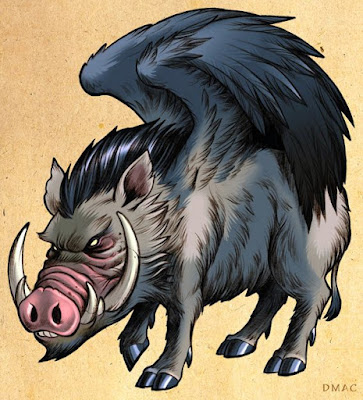Chrysaor was the brother of the winged horse Pegasus and son of Poseidon and the Gorgon Medusa. When Medusa was decapitated by Perseus, both Chrysaor and Pegasus were born at the same time.
Khrysaor was usually described as a giant but, at times, may have been envisaged as a winged-boar. The vase painting right depicts such a creature on the shield of Khrysaor's son Geryon.
Khrysaor's name means "golden-blade" which could be a sword, tusks, or, as in the case Demeter's title Khrysaoros, a reference to golden blades of wheat.
Little is known about Chrysaor; he was considered a stout-hearted warrior. He did not have a major role in Greek mythology.

Comments
Post a Comment